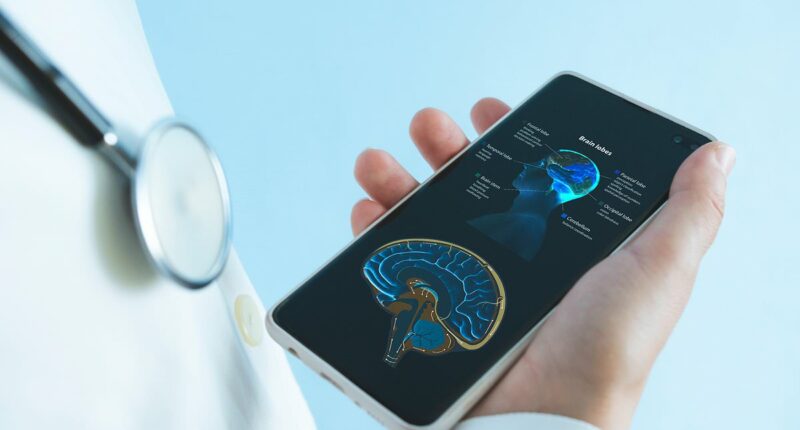Share this @internewscast.com
A newly released phone app could help measure early, tell-tale signs of a growing brain disease and provide early treatment options to halt its progression.
Researchers at the world’s largest dementia conference this week announced the rollout of Neu Health, a software downloaded on smartphones to measures tremors and other motor issues in people with Parkinson’s disease.
Suffered by about 1million Americans, Parkinson’s disease is a progressive brain disorder caused by the death of nerve cells in the brain that produce dopamine. This leads to movement and speech issues that worsen over time.
The disease is on the rise in the US, which experts have suggested could be due to environmental toxins and increased prevalence of ultra-processed foods.
Neu Health is a first-of-its-kind software downloaded onto the phones of people with a Parkinson’s diagnosis and paid for by doctor’s offices.
Between medical appointments, doctors can send patients a prompt to complete motor function tests, such as holding the phone in their hand or tapping objects on the screen.
The platform has gained FDA clearance this week, allowing it to be marketed in the US and used in doctor offices. It launched 18 months ago in the UK, where 145,000 people have the disorder, and now has about 1,700 participants.
Neu Health researchers speaking with DailyMail.com are hopeful the technology can help measure signs of Parkinson’s early in the disease, potentially stalling progress and slowing the rise of the condition across the US.

A newly FDA cleared app could help measure signs of Parkinson’s disease (stock image)
Caroline Cake, CEO and co-founder of Neu Health, told DailyMail.com at the Alzheimer’s Association International Conference (AAIC) in Toronto: ‘The aim is to keep it as low burden for the patient as possible, whilst getting the data and things that’s needed to actually progressing care.
‘We see confidence and knowledge levels increase quite considerably for patients while they’re using the product, which is really exciting to see. so they feel a better quality of life as a result of that.’
The app is available at Mass General Brigham in Boston and Cedars-Sinai Medical Center in Los Angeles, and now that it has FDA clearance, the company plans to roll it out to other hospitals nationwide.
The Parkinson’s Foundation estimates 1.2million Americans will be diagnosed with Parkinson’s by 2030, and 90,000 are struck by the disease every year.
There are roughly 35,000 deaths annually.
This is a 50 percent increase from the previously estimated rate of 60,000 a decade ago, the foundation estimates.
Experts believe environmental factors could partly be to blame for the rise of Parkinson’s disease in the US.
Researchers in Minnesota, for example, found exposure to the pollutant particulate matter, PM2.5, raised the risk of Parkinson’s disease by 36 percent.
Another study published earlier this month also found consuming at least 11 servings of ultra-processed food in a day increased the risk of early Parkinson’s symptoms by damaging dopamine-producing neurons.
There is no cure for Parkinson’s disease, but medications and other treatments can help replace lost dopamine and keep symptoms at bay.

The above image shows examples of prompts given in the Neu Health app

Andy, a Parkinson’s disease patient, using the Neu Health app to measure his symptoms
Cake noted this rise in Parkinson’s makes the advent of simple technology vital to improving patient health over time.
Neu Health uses a cell phone’s motion sensors and microphone to monitor a patient performing basic exercises like holding the phone, tapping objects on the screen or repeating words or phrases.
This is meant to measure the intensity of and changes in tremors, the most tell-tale sign of Parkinson’s, as well as shifts in balance, speech patterns and cognitive function.
Cake said: ‘It’s picking up reaction time changes, finger tapping, balance changes, things like that. It’s also picking up changes in cognition, medication and self-reported symptoms.’
Patients may receive a prompt through the app after doctors have adjusted their medications or started a new treatment to see how well they’re working. Cake says this may help doctors make critical adjustments faster without patients having to wait until their next follow-up.
She told this website: ‘If the clinician says, “Actually, we’ll change the medication, or we want to see what happened,” you do perhaps another baseline at that point, so you can see what changes happen for you.’
A pop-up would show up on the user’s phone with a prompt saying their doctor wants them to complete a series of exercises. Users receive a simplified report after and more detailed analytics get sent directly to the doctor.
This is especially vital for making Parkinson’s care more effective for patients between appointments, which can be several months apart and delayed.

Symptoms of Parkinson’s include tremors, slow movements and muscle stiffness

The above graph shows the increase in Parkinson’s cases and deaths in the US
Cake said: ‘Really importantly, [Neu Health] is also picking up information between [appointments], so you can see when patients are starting to diverge.
‘And because these are very complex conditions and there’s all sorts of variability there, we can start seeing which patients are actually steady versus which ones actually perhaps need to be seen.’
Cake also noted this may help indicate if medication doses need to be increased or if patients are progressing to a more severe stage of Parkinson’s disease.
Parkinson’s symptoms typically begin in a person’s mid-60s, which can make things like phone apps a challenge to implement.
However, Cake said she was pleasantly surprised during Neu Health’s UK rollout, as data showed older users were more likely to follow the app’s guidance than younger patients.
‘It’s a really interesting counter-narrative,’ she said.
The app will be free for patients and paid for by hospital systems that adopt it. Cake hopes as Neu Health gains a foothold in the US it could also be used for other neurodegenerative disorders like dementia and multiple sclerosis.
‘We can now scale this up. How can we do this at scale so that all Parkinson’s patients, all dementia patients, are getting this sort of care? So that’s exciting for me, the scale and the impact.’













